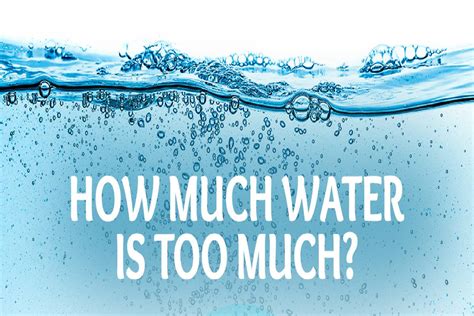Daily Water Intake: The Optimal Amount and the Risks of Overhydration

Hot Search Title: Water Overdose: How to Avoid Consuming Too Much H2O
Introduction
Water is essential for life, but is it possible to drink too much of it? The answer is yes. While water is essential for hydration, drinking too much can lead to a condition called water intoxication, also known as hyponatremia.
Recommended Daily Water Intake
The amount of water a person needs to drink each day varies depending on a number of factors, including age, activity level, climate, and overall health. However, general guidelines have been established by reputable organizations:
- The National Academies of Sciences, Engineering, and Medicine (NASEM) recommends that adult men drink about 15.5 cups (3.7 liters) of fluids per day, including water, other beverages, and food.
- Adult women should aim for around 11.5 cups (2.7 liters) of fluids per day.
- Children and adolescents have different recommendations based on their age and activity level.
Risks of Overhydration
Drinking too much water can lead to water intoxication. This occurs when the body’s sodium levels become diluted, causing the cells to swell. Symptoms of water intoxication include:
- Nausea and vomiting
- Headache
- Fatigue
- Confusion
- Seizures
- Coma
In severe cases, water intoxication can be fatal.
How to Avoid Overhydration
To avoid overhydration, it’s important to drink water in moderation. Follow these tips:
- Drink water when you’re thirsty.
- Don’t force yourself to drink water if you’re not thirsty.
- Be aware of other sources of fluids, such as beverages and foods.
- If you’re exercising intensely or sweating a lot, drink sports drinks to replenish electrolytes.
Signs of Dehydration
While overhydration is a concern, dehydration is a more common problem. Signs of dehydration include:
- Thirst
- Dry mouth
- Fatigue
- Headache
- Dizziness
- Confusion
Table 1: Recommended Daily Water Intake
| Age | Gender | Fluid Intake (Cups) |
|---|---|---|
| 1-3 years | Both | 4 |
| 4-8 years | Both | 5 |
| 9-13 years | Boys | 7 |
| 9-13 years | Girls | 6 |
| 14-18 years | Boys | 10 |
| 14-18 years | Girls | 8 |
| 19+ years | Men | 15.5 |
| 19+ years | Women | 11.5 |
Table 2: Symptoms of Water Intoxication
| Symptom | Severity |
|---|---|
| Nausea and vomiting | Mild |
| Headache | Mild to moderate |
| Fatigue | Mild to moderate |
| Confusion | Moderate to severe |
| Seizures | Severe |
| Coma | Severe and life-threatening |
Table 3: Tips to Avoid Overhydration
| Tip | Explanation |
|---|---|
| Drink water when you’re thirsty | Don’t force yourself to drink when you’re not thirsty. |
| Be aware of other sources of fluids | Beverages and foods also contribute to your daily fluid intake. |
| Replenish electrolytes | If you’re exercising heavily, drink sports drinks to replace lost electrolytes. |
| Monitor your urine color | Dark yellow urine can be a sign of dehydration, while clear or pale urine indicates adequate hydration. |
Table 4: Signs of Dehydration
| Sign | Severity |
|---|---|
| Thirst | Mild |
| Dry mouth | Mild |
| Fatigue | Mild to moderate |
| Headache | Mild to moderate |
| Dizziness | Moderate |
| Confusion | Severe |
Conclusion
Water is essential for life, but it’s important to drink it in moderation. Drinking too much water can lead to water intoxication, a potentially fatal condition. By following the tips outlined in this article, you can avoid overhydration and stay healthy and hydrated.
FAQ
Q: How much water should I drink each day?
A: The recommended daily water intake varies based on factors such as age, activity level, climate, and overall health. However, general guidelines have been established by reputable organizations like the National Academies of Sciences, Engineering, and Medicine (NASEM). Refer to the table in the article for specific recommendations based on age and gender.
Q: What are the symptoms of water intoxication?
A: Symptoms of water intoxication include nausea and vomiting, headache, fatigue, confusion, seizures, and coma. In severe cases, water intoxication can be fatal.
Q: How can I avoid overhydration?
A: To avoid overhydration, drink water when you’re thirsty, be aware of other sources of fluids, and replenish electrolytes if you’re exercising heavily. Monitor your urine color as a general indicator of hydration levels.
Q: What are the signs of dehydration?
A: Signs of dehydration include thirst, dry mouth, fatigue, headache, dizziness, and confusion.
















